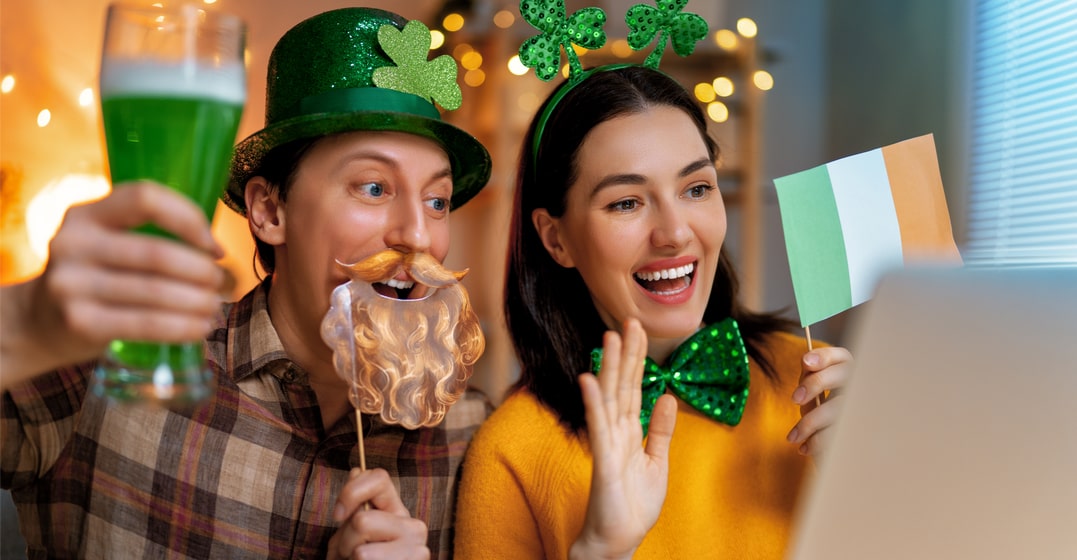by Lingoda Team
Updated on November 8, 2022
While Saint Patrick’s Day has taken on a commercial aspect in recent times and has grown into a general celebration of ‘Irishness’, the real purpose is to commemorate Saint Patrick, the patron saint of Ireland.
Held on 17th March, it is a public holiday in both the Republic of Ireland and Northern Ireland and is celebrated in many more countries.
Whether you are out and about on St. Patrick’s Day, or simply learning about the holiday, you are likely to encounter some Irish accent and unfamiliar words along the way. In order to help you out, we have compiled a quick St. Patrick’s Day vocabulary guide, featuring some of the most common words associated with the celebration.
Three-leaf clover, which is used as a symbol of Ireland.
Nickname for Ireland, coined by the poet William Drennan.
Small mythical creature with magical powers, associated with Ireland.
Another name for a violin, featured heavily in traditional Irish music.
A four-leaf variant of the clover, often viewed as a good luck charm.
An informal name for St. Patrick’s Day.
Name given to the national flag of Ireland.
An imaginary reward, associated with leprechauns and said to be found at the end of a rainbow.
A brand of Irish dry stout, which is the most popular alcoholic drink in Ireland.
A weapon, similar to a club, featured heavily in Irish folklore.
St. Patrick’s Day celebrates the life of Saint Patrick, one of the most significant figures in Irish Catholic history. However, interestingly, Saint Patrick was not actually Irish and was in fact born in Britain in the late 4th century. According to his own writings, he was kidnapped and taken to Ireland at the age of 16.
It is believed that Saint Patrick was held captive in Ireland for six years, working as a shepherd. After hearing a voice in his dreams, which he believed to be God, he escaped back to Britain, studied Christianity and became a priest. He then returned to Ireland, where he spent many years converting the inhabitants to Christianity.
English with Lucy also has some great idioms related to St Patrick’s day and the color green.
A popular myth developed over the years, claiming that Saint Patrick drove all the snakes out of Ireland. However, according to various experts, the region was never actually home to snakes at any point. In fact, this story is more likely to be a metaphor for the way Saint Patrick helped to drive the pagan traditions out of Ireland.
St. Patrick’s Day is celebrated on 17th March, which is believed to have been the date Saint Patrick died. Many historians place the year of his death at or around 460 AD, although some cite the later date of 493 AD. Regardless, the mythology surrounding Saint Patrick took hundreds of years to grow, with the first St. Patrick’s Day celebrations taking place in either the 9th or 10th century and initially consisting of a simple feast day.
Religious celebrations connected to St. Patrick’s Day typically include attending church services and enjoying a feast. Indeed, those celebrating St. Patrick’s Day are given an exemption from the restrictions on food and alcohol associated with Lent, and this is likely to be the reason why drinking became such a significant part of the occasion.
As with many other holidays, St. Patrick’s Day celebrations extend beyond the church and many people now celebrate the day more generally. Modern celebrations, which often consist of drinking Irish alcohol, wearing green, attending parades and listening to Irish music, have been influenced by the Irish diaspora, which resulted in Irish people emigrating to other parts of the world, including Britain and the United States.
St. Patrick’s Day is an official holiday in both the Republic of Ireland and Northern Ireland, as well as the province of Newfoundland in Canada, which has a significant Irish population. However, the day is widely celebrated in the United States, Great Britain and many other parts of the world as well.
St. Patrick’s Day remains a celebration of the patron saint of Ireland and of Irish culture, which means it naturally appeals to those with Irish heritage. However, the holiday has grown in significance to such an extent that many people with no link to Ireland join in the fun. These people often describe themselves as ‘Irish at heart’.
